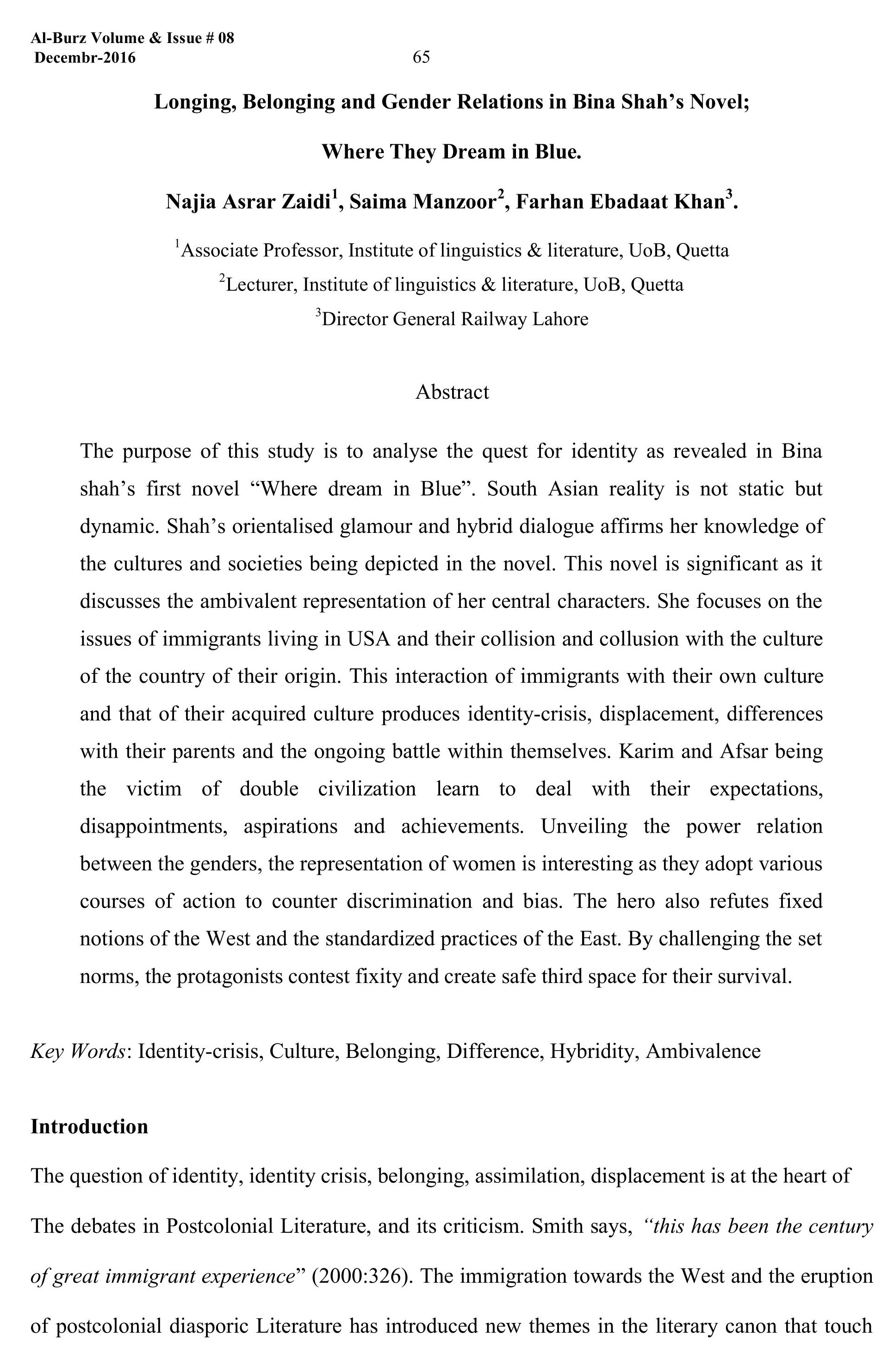Longing, Belonging and Gender Relations in Bina Shah’s Novel Where They Dream in Blue.
DOI:
https://doi.org/10.54781/abz.v8i1.134Keywords:
Identity-crisis, Culture, Belonging, Difference, Hybridity, AmbivalenceAbstract
The purpose of this study is to analyse the quest for identity as revealed in Bina shah’s first novel “Where dream in Blue”. South Asian reality is not static but dynamic. Shah’s orientalised glamour and hybrid dialogue affirms her knowledge of the cultures and societies being depicted in the novel. This novel is significant as it discusses the ambivalent representation of her central characters. She focuses on the issues of immigrants living in USA and their collision and collusion with the culture of the country of their origin. This interaction of immigrants with their own culture and that of their acquired culture produces identity-crisis, displacement, differences with their parents and the ongoing battle within themselves. Karim and Afsar being the victim of double civilization learn to deal with their expectations, disappointments, aspirations and achievements. Unveiling the power relation between the genders, the representation of women is interesting as they adopt various courses of action to counter discrimination and bias. The hero also refutes fixed notions of the West and the standardized practices of the East. By challenging the set norms, the protagonists contest fixity and create safe third space for their survival.
References
Bhabha, Homi.(1995) Cultural Diversity and Cultural Differences. The Post Colonial Studies Reader. Eds. Ashcroft Bill, Gareth Griffiths and Tiffin Helen. New York. London. Routledge. 206-207. Print
Bhabha, Homi. (1994) The Location of Culture. London. Rout ledge. 9.Print
Baeauvoir, S.De (1989). The Second Sex. Trans and Ed.H.M. Prashley.Prashley. Vintage Books. NY..xxii. Print.,
Bondi, Liz. (1993) Locating Identity Politics. Place and Politics of Identity. Eds. M. Keith and S. Pile. London. Routledge. Print. 84.
Interview for Chowk retrieved October 15, 2010 on Where They Dream in Blue.
Mitra,Singh and Kumar, Bachchan. (2004) Encyclopaedia of Women in South Asia. Kalpaz Publications. Delhi.Print.. Print. 115
Mernissi, Fatima. (1987) The Fundamentalist Obsession with Women. Lahore. Symorgh. Print.10
McDowell, Lindaand Joanne P. Sharpe, eds (1997). Space, Gender and Knowledge: Feminist Readings. London: Arnold, 1997.Print.
Mohanty, Chakrabarty,.Under Western Eyes. In P. Williams and L. Chrisman (ed). Colonial Discourses and Post-Colonial Theory A Reader. Harvester Wheatsheaf.
Nasta, Sushiela. (2002) Home Truths: Fictions of the South Asian Diaspora in Britain. Palgrave. Print
Nyman, Jopi. Transnational Travel in Baharti Mukherjee’s Desirable Darghters. The Atlantic Literary Review. Vol 3, No 4, Oct-Dec.2002
Peterson, Kriston H. & Rutherford, Anna. (1995)”Fossil and Psyche. The Post Colonial Studies Reader.London. Routledge.185-189.
Rahman, Bushra. (2012) Framing of Pakistani Muslim Women in International Media: Muslim Feminist’s Perspective. International Journal of Contemporary Research. Vol2 No1:January
Rutherford, Jonathan. (1990) Third Space. Interview With Homhi Bhabha: Identity, Community, Culture, Difference: Lawrence and Wishart. 207-221. Print.
Shah. Bina.(2004) Where They Dream in Blue.Islamabad.Alhamra.Print.
Smith,Zadie. (2000) White Teeth.London. Penguin. 326. Print
Weedon, Chris. (2004) Identity and Culture: Narratives of Difference and Belonging. Ed. Stuart Allan. Maidenhead: The Open UP, Print.
-------.(2008)Migration, Identity, and Belonging in British Black and South Asian Women’s Writing. 2.1: 27. Print.
Zaidi, A. Najia. (2012) Fiction and Autobiographical Writings By Pakistani Women Depicting Socio/Political Status of Women in Pakistan.(Ph.D Dissertation). University of Balochistan

Downloads
Published
How to Cite
Issue
Section
License
Copyright (c) 2021 Alburz

This work is licensed under a Creative Commons Attribution-NonCommercial-ShareAlike 4.0 International License.
Alburz has licensed under a CC Attribution-NonCommercial-ShareAlike 4.0



